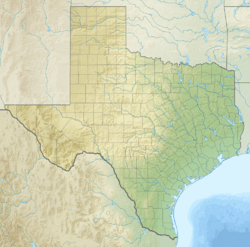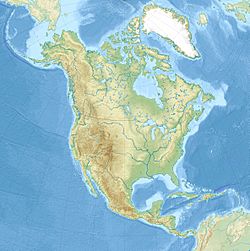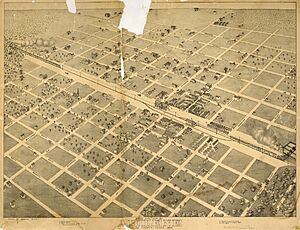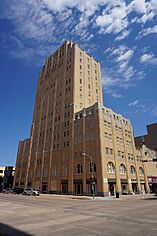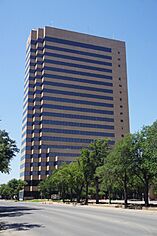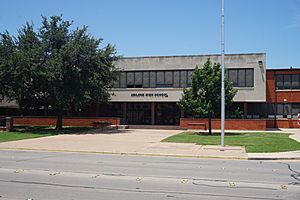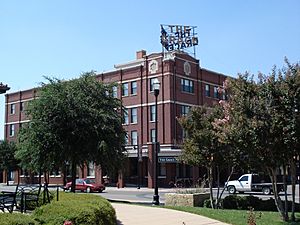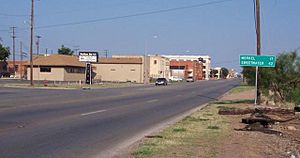Abilene, Texas facts for kids
Quick facts for kids
Abilene
|
||
|---|---|---|
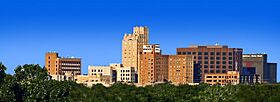
Downtown Abilene
|
||
|
||
Nicknames:
|
||
| Country | United States | |
| State | Texas | |
| Counties | Taylor, Jones | |
| Settled | 1881 | |
| Incorporated (town) | 1881 | |
| County seat | 1883 | |
| Named for | Abilene, Kansas | |
| County seat | Taylor County | |
| Government | ||
| • Type | Mayor–council–manager | |
| Area | ||
| • City | 112.09 sq mi (290.32 km2) | |
| • Land | 106.67 sq mi (276.27 km2) | |
| • Water | 5.42 sq mi (14.05 km2) | |
| Elevation | 1,719 ft (527 m) | |
| Population
(2020)
|
||
| • City | 125,182 |
|
| • Density | 1,157/sq mi (447/km2) | |
| • Metro | 176,579 | |
| • Demonym | Abilenian | |
| Time zone | UTC−6 (CST) | |
| • Summer (DST) | UTC−5 (CDT) | |
| ZIP codes |
79601-08 79697-99
|
|
| Area code | 325 | |
| FIPS code | 48-01000 | |
| GNIS feature ID | 2409657 | |
Abilene (pronounced AB-i-leen) is a city in Texas, United States. It is located in Taylor and Jones counties. In 2020, about 125,182 people lived here. Abilene is the main city of the Abilene metropolitan area, which had a population of 176,579 in 2020.
The city is home to three Christian universities: Abilene Christian University, McMurry University, and Hardin–Simmons University. Abilene is also the county seat for Taylor County. Dyess Air Force Base, a large military base, is on the west side of the city.
Abilene is on Interstate 20, a major highway that goes around the northern part of the city. It is about 150 miles (241 km) west of Fort Worth. The old Texas and Pacific Railway line, now part of the Union Pacific railroad, divides the city into a northern and southern part. The historic downtown is north of the tracks, and a new area called "SODA" (South of Downtown Abilene) is growing to the south.
Contents
History of Abilene
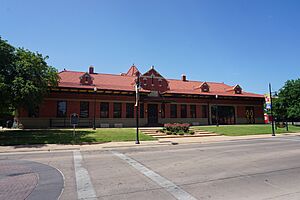
Abilene was started in 1881 by cattle ranchers. They needed a place to ship their cattle using the Texas and Pacific Railway. The city was named after Abilene, Kansas, which was a famous endpoint for cattle drives on the Chisholm Trail.
A landowner named Clabe Merchant, often called the "father of Abilene," chose the name for the new town. Before the land lots were even sold, about 800 people were already camping at the site! The first lots were sold on March 15, 1881. On the first day, 139 lots were sold for over $23,000.
Abilene became an official town in 1881. Soon after, residents voted to make it the county seat, which means it became the main town for Taylor County. Groups were formed to help the city grow and attract businesses. By 1900, Abilene had 3,411 people.
Growing with Education
In 1891, Simmons College was founded. This was the first of three universities in Abilene. Later, Childers Classical Institute was started in 1906, which became Abilene Christian University. In 1923, McMurry College was founded. These universities have helped Abilene grow and become a center for learning.
Military and Modern Growth
In 1940, people in Abilene raised money to buy land for a U.S. Army base called Camp Barkeley. It became very large, with 60,000 soldiers. After World War II, the base closed, and some worried Abilene might become a "ghost town." But many veterans came back to start businesses, and the city continued to grow.
In the 1950s, residents again raised money to buy land for an Air Force base. This base, Dyess Air Force Base, became the city's largest employer. It has provided many jobs for decades.
From 1950 to 1960, Abilene's population almost doubled! In 1960, a second high school, Cooper High School, was built.
In 1966, the Abilene Zoo was created. The city also built the Abilene Civic Center and the Taylor County Coliseum. These places host many events and activities.
In the 1980s and 1990s, Abilene focused on making its downtown area better. Places like The Grace Museum and Paramount Theatre were restored. New attractions like Frontier Texas!, a museum about the area's history, were also built.
Today, Abilene is an important center for business, shopping, healthcare, and transportation for a large area known as "The Big Country."
Timeline of Abilene
- 1881
- Settlement established.
- Texas & Pacific Railroad begins operating.
- Abilene Reporter newspaper begins publication.
- 1883
- Town of Abilene incorporated.
- D. B. Corley becomes mayor.
- Abilene becomes seat of Taylor County.
- 1890 – Population: 3,194.
- 1891 – Simmons College founded.
- 1898 – "Federation" subscription library organized.
- 1903 – Saloons banned in Abilene.
- 1906 – Childers Classical Institute established.
- 1910 – Population: 9,204.
- 1919 – Abilene Zoological Gardens established.
- 1923 – McMurry College established.
- 1924 – First Presbyterian Church built.
- 1925 – Majestic Theater, a major movie theater, opened.
- 1930
- Paramount Theatre in business.
- Population: 23,175.
- 1936 – KRBC radio begins broadcasting.
- 1937
- Abilene Reporter-News in publication.
- Regional "West Texas Chamber of Commerce" relocated to Abilene.
- 1942 – Temple Mizpah (synagogue) built.
- 1946 – Abilene Blue Sox baseball team formed.
- 1947 – Office of city manager established.
- 1949 – Park Drive-In cinema in business.
- 1950 – Abilene Philharmonic Orchestra active.
- 1953 – KRBC-TV (television) begins broadcasting.
- 1956
- U.S. military Abilene Air Force Base begins operating.
- KPAR-TV (television) begins broadcasting.
- 1960 – Population: 90,368.
- 1977 – Abilene Preservation League organized.
- 1978 – Alcohol prohibition ends in Abilene.
- 1979 – Charles Stenholm was elected as the Democratic U.S. representative for Texas's 17th congressional district. He was re-elected for 13 terms.
- 2000 – City website online (approximate date).
- 2001 – World War II-related "12th Armored Division Memorial Museum" opens.
- 2005 – Republican Randy Neugebauer was elected as U.S. representative for Texas's newly redrawn 19th congressional district, including Abilene.
- 2010 – Population: 117,063.
- 2017 – Jodey Arrington becomes U.S. representative for Texas's 19th congressional district.
- 2019 – revamping the downtown area of North Abilene. As of October 2019 a couple of buildings were torn down and Hilton developed a new Double Tree hotel.
Geography and Climate
Abilene is located in northeastern Taylor County. Part of the city also extends into Jones County. Interstate 20 connects Abilene to Fort Worth (149 miles east) and Midland (148 miles west).
The city has a total area of about 112 square miles (290.6 sq km). About 5.4 square miles (14.0 sq km) of this area is water. This water comes mainly from three lakes: Lytle Lake, Kirby Lake, and Lake Fort Phantom Hill.
What is Abilene's Climate Like?
Abilene has a humid subtropical climate. This means it has hot, humid summers and mild winters. Areas to the west of Abilene are more dry, or semi-arid.
| Climate data for Abilene, Texas (Abilene Regional Airport), 1991−2020 normals, extremes 1885–present | |||||||||||||
|---|---|---|---|---|---|---|---|---|---|---|---|---|---|
| Month | Jan | Feb | Mar | Apr | May | Jun | Jul | Aug | Sep | Oct | Nov | Dec | Year |
| Record high °F (°C) | 90 (32) |
94 (34) |
98 (37) |
104 (40) |
109 (43) |
110 (43) |
110 (43) |
113 (45) |
108 (42) |
103 (39) |
93 (34) |
90 (32) |
111 (44) |
| Mean maximum °F (°C) | 78.6 (25.9) |
82.9 (28.3) |
88.6 (31.4) |
93.2 (34.0) |
98.6 (37.0) |
100.1 (37.8) |
102.6 (39.2) |
102.4 (39.1) |
97.5 (36.4) |
92.4 (33.6) |
83.2 (28.4) |
77.9 (25.5) |
104.6 (40.3) |
| Mean daily maximum °F (°C) | 58.8 (14.9) |
62.8 (17.1) |
70.9 (21.6) |
79.2 (26.2) |
86.3 (30.2) |
92.8 (33.8) |
96.4 (35.8) |
96.0 (35.6) |
88.7 (31.5) |
79.3 (26.3) |
67.8 (19.9) |
59.4 (15.2) |
78.2 (25.7) |
| Daily mean °F (°C) | 46.3 (7.9) |
50.1 (10.1) |
58.1 (14.5) |
66.0 (18.9) |
74.1 (23.4) |
81.1 (27.3) |
84.7 (29.3) |
84.2 (29.0) |
76.8 (24.9) |
67.0 (19.4) |
55.5 (13.1) |
47.3 (8.5) |
65.9 (18.9) |
| Mean daily minimum °F (°C) | 33.7 (0.9) |
37.4 (3.0) |
45.3 (7.4) |
52.8 (11.6) |
61.9 (16.6) |
69.5 (20.8) |
73.1 (22.8) |
72.4 (22.4) |
65.0 (18.3) |
54.7 (12.6) |
43.3 (6.3) |
35.2 (1.8) |
53.7 (12.1) |
| Mean minimum °F (°C) | 17.8 (−7.9) |
20.1 (−6.6) |
25.3 (−3.7) |
34.7 (1.5) |
45.2 (7.3) |
59.6 (15.3) |
65.8 (18.8) |
63.0 (17.2) |
49.8 (9.9) |
35.3 (1.8) |
24.8 (−4.0) |
18.8 (−7.3) |
14.0 (−10.0) |
| Record low °F (°C) | −9 (−23) |
−7 (−22) |
9 (−13) |
25 (−4) |
33 (1) |
44 (7) |
54 (12) |
48 (9) |
38 (3) |
23 (−5) |
13 (−11) |
−7 (−22) |
−9 (−23) |
| Average precipitation inches (mm) | 1.10 (28) |
1.29 (33) |
1.73 (44) |
1.86 (47) |
3.21 (82) |
3.44 (87) |
1.92 (49) |
2.53 (64) |
2.67 (68) |
2.83 (72) |
1.40 (36) |
1.26 (32) |
25.24 (641) |
| Average snowfall inches (cm) | 0.7 (1.8) |
1.0 (2.5) |
0.1 (0.25) |
0.3 (0.76) |
0.0 (0.0) |
0.0 (0.0) |
0.0 (0.0) |
0.0 (0.0) |
0.0 (0.0) |
0.0 (0.0) |
0.7 (1.8) |
0.9 (2.3) |
3.7 (9.4) |
| Average precipitation days (≥ 0.01 in) | 4.6 | 5.1 | 5.8 | 4.7 | 8.0 | 6.9 | 4.7 | 6.0 | 5.9 | 6.2 | 4.5 | 4.8 | 67.2 |
| Average snowy days (≥ 0.1 in) | 0.5 | 0.8 | 0.2 | 0.0 | 0.0 | 0.0 | 0.0 | 0.0 | 0.0 | 0.1 | 0.3 | 0.5 | 2.4 |
| Mean monthly sunshine hours | 204.6 | 203.4 | 263.5 | 282.0 | 306.9 | 330.0 | 347.2 | 316.2 | 258.0 | 248.0 | 198.0 | 192.2 | 3,150 |
| Source 1: NOAA | |||||||||||||
| Source 2: National Weather Service Hong Kong Observatory (sun only, 1961–1990) | |||||||||||||
Cool Buildings in Abilene
Abilene has several interesting and historic buildings:
- The Hotel Wooten (built 1930) is a 16-story building downtown. It was designed like the Drake Hotel in Chicago. Today, it is a fancy apartment building.
- First Baptist Church (built 1954) has a spire that reaches 140 feet (43 meters) high.
- The Church of the Heavenly Rest, Episcopal, has a surprising Gothic style of architecture. It looks like a church you might see in Europe!
- The 20-story Enterprise Tower is the tallest building in Abilene. It stands 283 feet (86 meters) above the ground.
- The Taylor County Courthouse has a modern look with concrete and pink granite.
- The Paramount Theatre opened in 1930. It was restored in 1986 and once had a huge marquee with 1,400 lights!
- Lincoln Junior High School (built 1923) is on the National Register of Historic Places. It has a Gothic Revival style with cool details like gargoyles. It used to be Abilene High School. Now, it is being renovated to become a community center and the new main branch of the Abilene Public Library.
People of Abilene
| Historical population | |||
|---|---|---|---|
| Census | Pop. | %± | |
| 1890 | 3,194 | — | |
| 1900 | 3,411 | 6.8% | |
| 1910 | 9,204 | 169.8% | |
| 1920 | 10,274 | 11.6% | |
| 1930 | 23,175 | 125.6% | |
| 1940 | 26,612 | 14.8% | |
| 1950 | 45,570 | 71.2% | |
| 1960 | 90,368 | 98.3% | |
| 1970 | 89,653 | −0.8% | |
| 1980 | 98,315 | 9.7% | |
| 1990 | 106,707 | 8.5% | |
| 2000 | 115,930 | 8.6% | |
| 2010 | 117,063 | 1.0% | |
| 2020 | 125,182 | 6.9% | |
| U.S. Census Bureau | |||
In 2020, Abilene had 125,182 people. There were about 46,134 households.
- About 56.23% of the people were White (not Hispanic).
- About 9.78% were Black or African American.
- About 2.14% were Asian.
- About 26.87% of the population was Hispanic or Latino (who can be of any race).
The median age in Abilene was 33.7 years old. This means half the people were younger than 33.7, and half were older.
Abilene's Economy
Abilene's economy used to be mostly about livestock and farming. Today, it relies heavily on government jobs, education, healthcare, and manufacturing. The oil industry is also important in the areas around the city. Abilene works to attract new businesses by offering help like job training and moving grants.
Who are the Biggest Employers?
Here are the top employers in Abilene:
| Rank | Employer | Employees |
|---|---|---|
| 1 | Dyess Air Force Base | 8,864 |
| 2 | Hendrick Health System | 4,032 |
| 3 | Abilene Independent School District | 2,450 |
| 4 | Abilene Christian University | 1,900 |
| 5 | City of Abilene | 1,299 |
| 6 | Abilene State Supported Living Center | 1,225 |
| 7 | Texas Department of Criminal Justice | 1,187 |
| 8 | Blue Cross Blue Shield of Texas | 1,061 |
| 9 | Taylor County | 560 |
| 10 | First Financial Bank | 540 |
Education in Abilene
Schools for Kids
Most of Abilene is part of the Abilene Independent School District (AISD). Some parts are in other school districts like Wylie, Eula, and Merkel.
The main high schools are Abilene High School and Cooper High School (both AISD), and Wylie High School (Wylie ISD).
Colleges and Universities
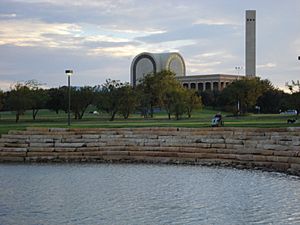
Abilene is home to six colleges and universities. Three of them are connected to religious groups. Hardin–Simmons University is the oldest, founded in 1891. Abilene Christian University is the largest, with over 6,000 students.
| Name | Affiliation | Founded | Enrollment |
|---|---|---|---|
| Abilene Christian University | Churches of Christ | 1906 | 6,219 |
| Cisco College | 1972 | 3,256 | |
| Hardin–Simmons University | Baptist | 1891 | 1,765 |
| McMurry University | Methodist | 1923 | 1,237 |
| Texas State Technical College West Texas | 1985 | 1,049 | |
| Texas Tech University Health Sciences Center Abilene Campus | 2006 | 332 |
Healthcare
Hendrick Medical Center has two large hospital campuses in Abilene. It is one of the city's biggest employers and helps many people with their health needs.
The Presbyterian Medical Care Mission is a clinic that helps people with low incomes or no health insurance.
Culture and Fun Things to Do
Abilene's culture is a mix of its college campuses, the local farming community, and a growing downtown area with fun nightlife.
Here are some cool places and activities in Abilene:
- The restored Paramount Theatre
- The Abilene Philharmonic Orchestra (a group that plays classical music)
- The Grace Museum
- The Center for Contemporary Arts
- The National Center for Children's Illustrated Literature (a great place for art and books!)
- The Abilene Zoo
- Frontier Texas! (a multimedia museum about local history)
- The 12th Armored Division Museum
- The Taylor County Expo Center
- The Abilene Convention Center
- Six libraries (three public, three private)
- 26 public parks
- Several TV and radio stations, including an NPR station (89.5 KACU).
Media in Abilene
Newspapers
The Abilene Reporter-News is the main daily newspaper for Abilene and the surrounding "Big Country" area.
Television Stations
- KRBC-TV (NBC)
- KTES-LD (TBD)
- KTXS-TV (ABC)
- KTAB-TV (CBS)
- KXVA-TV (FOX)
Radio Stations
- 88.1 FM KGNZ (Christian contemporary)
- 89.5 FM KACU (Public Radio)
- 90.5 FM KAGT (Christian contemporary)
- 91.3 FM KAQD (Religious)
- 91.7 FM KQOS (Religious)
- 92.5 FM KMWX (Red Dirt Country)
- 93.3 FM KBGT (Tejano)
- 94.1 FM KVVO-LP (Inspirational Country)
- 95.1 FM KABW (Country)
- 96.1 FM KORQ (Farm, Country)
- 98.1 FM KTLT (Active Rock)
- 99.7 FM KBCY (Country)
- 100.7 FM KULL (Classic hits)
- 101.7 FM KABT (Americana and red dirt country)
- 102.7 FM KHXS (Classic Rock)
- 103.7 FM KCDD (Top 40)
- 105.1 FM KEAN (Country)
- 106.3 FM KTJK (variety hits)
- 106.9 FM KLGD (Country)
- 107.9 FM KEYJ (Active Rock)
- 1280 AM KSLI (Country)
- 1340 AM KWKC (News Talk)
- 1470 AM KYYW (News Talk)
- 1560 AM KZQQ (Sports talk)
Transportation
Major Highways in Abilene
Airport
Abilene is served by the Abilene Regional Airport.
Famous People from Abilene
Many notable people have connections to Abilene:
- Ken Baumann, actor
- Doyle Brunson, a two-time World Series of Poker champion, played basketball at Hardin–Simmons College.
- Randall "Tex" Cobb, heavyweight boxer and actor.
- Charles Coody, a Masters-winning professional golfer.
- Carole Cook, an actress, was born in Abilene.
- Roy Crane, a nationally famous cartoonist.
- Bob Estes, professional golfer.
- Ryan Guzman, actor.
- David W. Harper, actor, known for The Waltons.
- Kristy Hawkins, professional bodybuilder.
- Katie Hill, former U.S. congresswoman.
- Micah P. Hinson, indie rock singer.
- Gregory Hoblit, film director.
- Case Keenum, NFL quarterback.
- Johnny Knox, former NFL wide receiver.
- John Lackey, former Major League Baseball pitcher.
- Deirdre Lovejoy, actress.
- Billy Maxwell, golfer.
- Bobby Morrow, three-time Olympic gold medalist in track and field.
- Billy Olson, pole vaulter who held world records.
- Fess Parker, actor known for playing Davy Crockett and Daniel Boone.
- Lee Roy Parnell, country musician.
- Vinnie Paul, musician and drummer for the band Pantera.
- Dominic Rhodes, former NFL football player.
- Bill Sharman, Hall-of-Fame NBA basketball player and coach.
- Jessica Simpson, singer and actress, was born in Abilene.
- Steven Stucky, a Pulitzer Prize-winning composer.
- Sarah Weddington, lawyer, known for the Roe v. Wade case.
- Ann Wedgeworth, actress.
- Mason Williams, musician, famous for "Classical Gas."
Sister Cities
Abilene has two sister cities:
 Chita, Russia
Chita, Russia- Río Cuarto, Córdoba, Argentina
See also
 In Spanish: Abilene (Texas) para niños
In Spanish: Abilene (Texas) para niños
 | Valerie Thomas |
 | Frederick McKinley Jones |
 | George Edward Alcorn Jr. |
 | Thomas Mensah |



